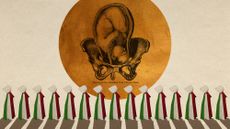Why South Africa leads the world in penis transplants
South African doctors completed the world's third ever penis transplant with a white donor and a black recipient

On 21 April 2017 South African doctors conducted the world’s third-ever penis transplant. The operation conquered a new frontier for the procedure: it involved a white donor and a black recipient.
Due to a lack of donors, the doctors could not find an organ from someone of the same race. The donor in this case was a 21-year-old left brain dead after a severe asthma attack. His family were initially reluctant donate the appendage but finally gave doctors the go-ahead for the difficult nine-hour procedure.
The recipient was a 40-year-old who lost his penis 17 years ago due to complications resulting from a traditional circumcision, says Health 24.
Subscribe to The Week
Escape your echo chamber. Get the facts behind the news, plus analysis from multiple perspectives.

Sign up for The Week's Free Newsletters
From our morning news briefing to a weekly Good News Newsletter, get the best of The Week delivered directly to your inbox.
From our morning news briefing to a weekly Good News Newsletter, get the best of The Week delivered directly to your inbox.
“Traditional circumcision has claimed many young lives in South Africa. For this patient, life will never be the same again,” Dr Nomafrench Mbombo told Health 24.
As a result of the tradition of male circumcision in several communities - including the amaXhosa, South Africa’s second largest ethnic group - South Africa has the world’s highest rate of penis amputations.
Around 48,000 circumcisions took place in 2015 and most occur in Cape, the country’s poorest province. When the procedure has complications, which happens often in unsanctioned and unsanitary facilities, the results can be disastrous.
The procedure “leads to dozens of South African men’s deaths each year - many from dehydration or septicemia. As many as 46 initiates died in the Eastern Cape in the 2015-2016 season alone,” Quartz says.
Legislation aimed at reducing the death rate has had little impact, and those who survive botched circumcisions often have no choice but to undergo complete amputation.
Azola Nkqinqa was circumcised in 2013 at the age of 18. While the advised method for circumcisions is to use razors, his ritual was performed using a knife that was also used on 13 other boys.
After noticing Nkqinqa was suffering from dehydration and that his penis was changing colour, local community activist Patrick Dakwa decided to pull him out of the ritual and take him to seek medical attention.
“If he [had been] there for the next 12 hours, he might be one of the statistics, counted as a dead person,” Dakwa told Quartz.
Nkqinqa ultimately had to have his penis removed and experience the social stigma that haunts many men in South Africa who experience botched circumcisions and ‘lose’ their manhood. He dropped out of school and turned to alcohol.
“Nkqinqa doubts he will ever be able to have a child," Quartz says, "but if he does, he says he would not allow his son to participate in traditional circumcision.”
Create an account with the same email registered to your subscription to unlock access.
Sign up for Today's Best Articles in your inbox
A free daily email with the biggest news stories of the day – and the best features from TheWeek.com
-
 Italian senate passes law allowing anti-abortion activists into clinics
Italian senate passes law allowing anti-abortion activists into clinicsUnder The Radar Giorgia Meloni scores a political 'victory' but will it make much difference in practice?
By Chas Newkey-Burden, The Week UK Published
-
 Magazine interactive crossword - May 3, 2024
Magazine interactive crossword - May 3, 2024Puzzles and Quizzes Issue - May 3, 2024
By The Week US Published
-
 Magazine solutions - May 3, 2024
Magazine solutions - May 3, 2024Puzzles and Quizzes Issue - May 3, 2024
By The Week US Published
-
 Nigeria's worsening rate of maternal mortality
Nigeria's worsening rate of maternal mortalityUnder the radar Economic crisis is making hospitals unaffordable, with women increasingly not receiving the care they need
By Harriet Marsden, The Week UK Published
-
 Dengue hits the Americas hard and early
Dengue hits the Americas hard and earlySpeed Read Puerto Rico has declared an epidemic as dengue cases surge
By Peter Weber, The Week US Published
-
 How happy is Finland really?
How happy is Finland really?Today's Big Question Nordic nation tops global happiness survey for seventh year in a row with 'focus on contentment over joy'
By Harriet Marsden, The Week UK Published
-
 How Tehran became the world's nose job capital
How Tehran became the world's nose job capitalUnder the radar Iranian doctors raise alarm over low costs, weak regulation and online influence of 'Western beauty standards'
By Harriet Marsden, The Week UK Published
-
 Africa's renewed battle against female genital mutilation
Africa's renewed battle against female genital mutilationUnder the radar Campaigners call for ban in Sierra Leone after deaths of three girls as coast-to-coast convoy prepares to depart
By Harriet Marsden, The Week UK Published
-
 Argentina: the therapy capital of the world
Argentina: the therapy capital of the worldUnder the radar Buenos Aires natives go hungry to pay for psychoanalysis, amid growing instability, anxiety – and societal acceptance
By Harriet Marsden, The Week UK Published
-
 Does declining birth rate spell doom for Britain?
Does declining birth rate spell doom for Britain?Today's Big Question Ageing population puts pressure on welfare state, economy and fabric of society, while fertility is rising on populist agendas
By Harriet Marsden, The Week UK Published
-
 How a new blood test could revolutionise sepsis diagnosis
How a new blood test could revolutionise sepsis diagnosisThe Explainer Early results from ongoing trial suggest faster identification of deadly condition is possible
By The Week Staff Published